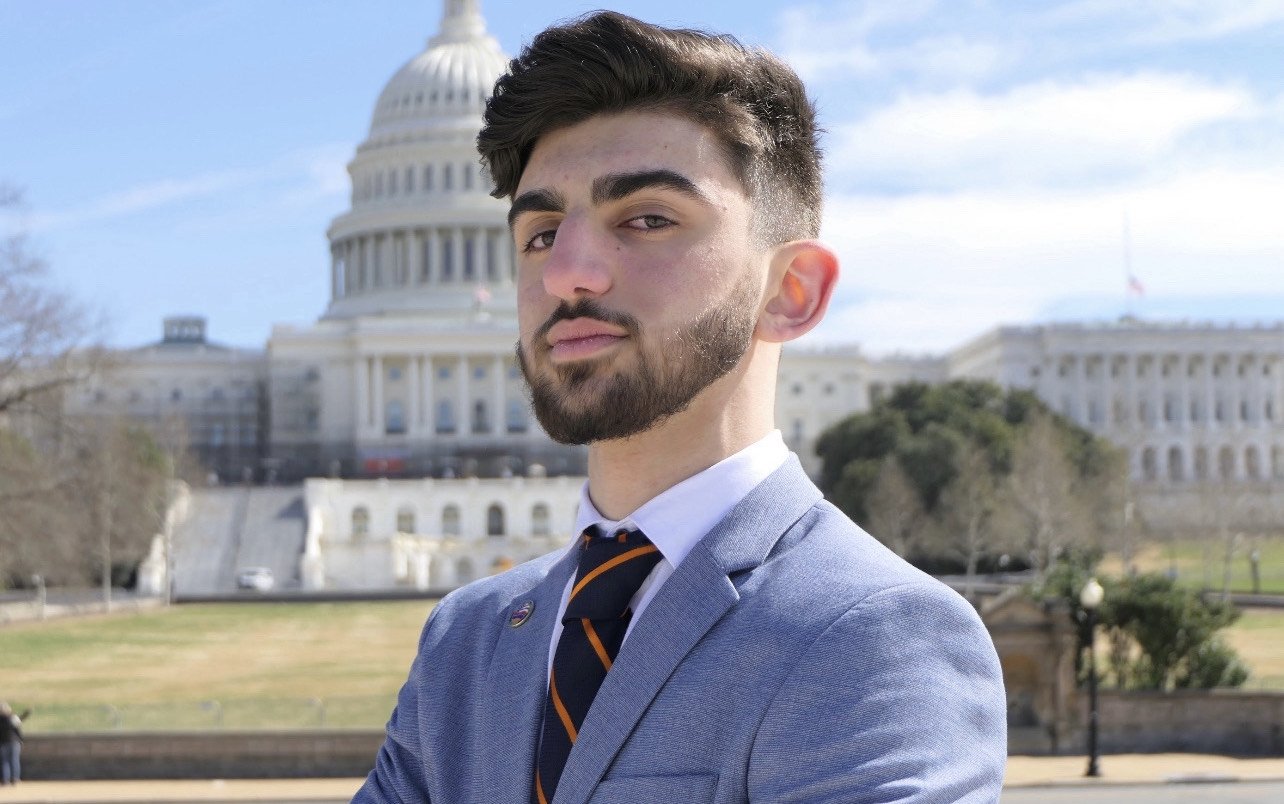
Trey Davis and Stephen Dalil stand out at protests organized by the Armenian Youth Federation – Youth Organization of the Armenian Revolutionary Federation (AYF-YOARF). The duo seems out of place among the crowd of Armenians and stumble through the pronunciation of complicated Armenian words during chants. Yet that doesn’t stop them from showing up and getting involved by consistently attending protests, posting on social media and donating to fundraisers. The average Armenian might think these two couldn’t even point out the nation on a map. I am proud to say that Trey and Stephen are two of my closest friends, and seeing them so involved and outspoken is heartwarming and inspiring.
Both Davis and Dalil credit their friendship with Antranig Kasbarian and me as the primary catalyst for their support, but they also have deeper motives than the fraternal bond. For Dalil, commitment to the Armenian cause is just “the right thing to do.” This sentiment is echoed by Davis, whose “love of learning” and desire to “make a positive impact on the world” have driven him to work to correct “the gross negligence of the worldwide community” on the Armenian issue. Davis and Dalil are not only examples of good friends, but also of the impact that we, as representatives of our nation and people, can have on those around us by informing and activating them for the cause. By bringing in non-Armenian supporters and allies, the mission for a free, independent and united Armenia becomes much more attainable, as it will no longer be only Armenians who have that end goal in mind.
This same process can be seen whenever a celebrity speaks up for the issues that Armenia and Artsakh face. Most recently, French footballer Olivier Giroud pledged to donate a large portion of the proceeds from the sale of one of his World Cup jerseys to Artsakh, a statement that thrilled Armenian fans of the sport. Hollywood stars like George Clooney and Oscar Isaac have also released statements on Genocide recognition, with the latter doubling down on his support during the 44-day Artsakh War by describing the continued jeopardy of Armenians in the region as “heartbreaking.” Actors Michael B. Jordan and Sean Penn also made social media posts during the 44-day Artsakh War in support of Artsakh and its people. These big names have all helped spread awareness for the Armenian people and the Armenian cause. The discourse around their support seems to always vary from praise to pessimistic disregard because “this won’t change anything.” Yet having people with influence speak empathetically on Armenian issues can never hurt.
Posting a video or statement on social media, however “easy” it may seem, has force behind it—Armenian leverage. Jordan specified that he was thinking about his “Armenian friends” during the war, and actor/director Mel Gibson made clear in his statement on the war that he has “many Armenian friends” who have “told [him] about the pains [and] loss of life.” Giroud also has Armenian connections, notably close friend Youri Djorkaeff, a French-Armenian football legend who also serves on the Armenian Sporting Board. If having a friendship with someone who is Armenian can elicit recognition and sympathetic responses from notable members of society, those of us living in the US, where we interact with non-Armenians on a daily basis, should maximize the implications of that knowledge every day.
We are taught, and correctly so, to fight assimilation in our day-to-day lives and stay as “Armenian” as possible, with each individual (inevitably) having their own idea of what that entails. Increasingly deeper roots have been set in the United States, and Armenian families commonly find themselves on their second, third or even fourth generations in America. This settlement in the US, combined with the difficulty of repatriation due to war, housing crises and other factors, have forced diasporan Armenians to work to grow the communities existing around them. A large part of this is investing time and effort into local organizations, but another important and largely under-appreciated aspect of this process is the incorporation and encouragement of non-Armenian allies.
As an Armenian diaspora, we have fought to create little corners of society where we can be Armenian, with local organizations and churches fulfilling the role of maintaining our Armenian identity in an American society. That being said, keeping this Armenian-ness in those little corners limits the interaction and impact our voices can have. By living the Armenian cause and struggle every day, the non-Armenians around us are exposed to our stories and voices in a way that may very well move them to join us for a righteous cause.
Simply put, provided they have the means, if your friend has a free evening, they should be at the protest happening that night. If they give you an excuse, well, I guess I just have better friends than you.



Be the first to comment